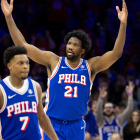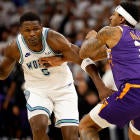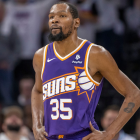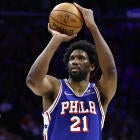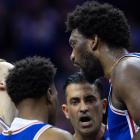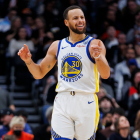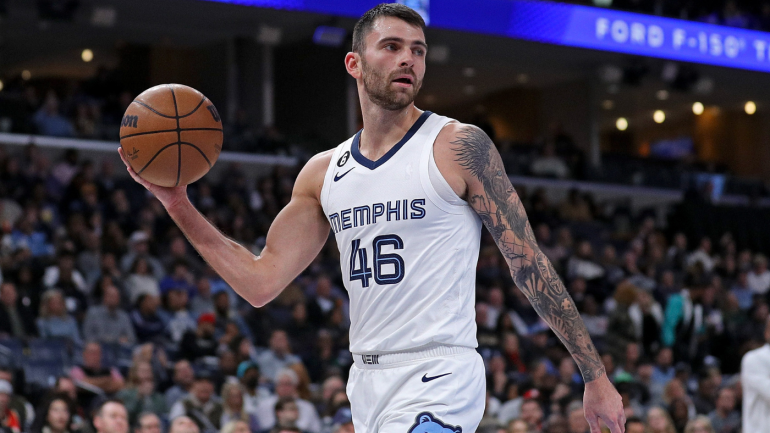
Sometimes, when John Konchar is on the court, he gets the sense that an opponent is not familiar with his game. No credible scouting report would describe him as a poor defender, but this does not stop ballhandlers from targeting him. "People will go at me, like, not knowing really who I am," Konchar said.
He said this in the stands at Barclays Center, after the Memphis Grizzlies' morning shootaround. When center Steven Adams walked off the court, the only player still around, doing an interview, was the unassuming guy who has fewer Twitter followers than the mascot.
"Hey John, come on, mate," Adams shouted. "The bus is not gonna f---in' wait for you!"
Unlike Adams (aka Aquaman) and Jaren Jackson Jr. (aka "The Block Panther"), Konchar is rarely likened to a superhero. He is not a gravity-defying franchise player on a redemption arc, nor is he a villain out to instigate and irritate. But he is a character, which is why, in the locker room before a game, Grizzlies guard Tyus Jones was at a loss for words.
Jones started to repeat my question to teammate Brandon Clarke: "If you've never seen John play before … "
"He's a water boy!" Clarke interrupted, laughing. "That's what I thought. Then, all of a sudden, he takes off and dunks on somebody. Then he says, 'Great pass!'"
"If you saw him just walking down [the street] -- I mean, even walking into the game, you wouldn't assume he's an NBA player," Jones said.
The NBA is a traveling circus, driven not just by superstars doing superhuman things, but by larger-than-life personalities, egos and contracts. The vibe Konchar gives off is I'm here too lol.
Part of it is that he "wears Crocs 24/7, stuff like that," Jones said. "Even just his demeanor on the court -- he doesn't show emotion a lot. He has the most random jersey number: 46. All these different things, you're just like scratching your head. And he'll go get a tip dunk or he'll hit five 3s in a game, and then you're just sitting there, like, 'Oh, this dude can hoop.'"
Konchar looks, according to people on Twitter, like a junior high school teacher, a fan who snuck onto the court for shootaround or, more bluntly, "a generic white dude." He can tell, he said, that players "don't expect me to probably be able to jump and dunk sometimes."
Last February, within weeks of John Hollinger of The Athletic writing that he "might be the league's most anonymous good player," Konchar was chatting with his agent, George Langberg, and Langberg's friend after a win at Madison Square Garden when a security guard approached the trio. "Who are you guys with?" the security guard said. "You can't be on the court." Rather than explaining that he'd just played on that court, Konchar deferred to the other two.
On the loud, brash Grizzlies, Konchar is an anomaly. In mic'd up segments, he's dropped one-liners as savage as, "This is a great sports game here." In conversation, he is perfectly polite and pleasant but keeps his answers succinct. While he seemed a bit amused by my presence, it wasn't necessarily welcomed.
"I like kind of staying under the radar," he said.
Undrafted out of Purdue Fort Wayne, Konchar agreed to a two-way contract with Memphis the same night that it selected Ja Morant with the second overall pick. This season, his fourth, he started 23 games and averaged 20.8 minutes for the No. 2 team in the West, helping the Grizzlies overcome a litany of injuries. Their first-round series against the Los Angeles Lakers will not be a Konchar vs. LeBron showdown, but he provided regular-season stability: He was in four of their eight most-used lineups, and those units collectively outscored opponents by 14.4 points per 100 possessions.
He was also the only player in the league to make a no-look reverse layup. To a subset of very online Grizzlies diehards, Konchar is something of an everyman icon.
"It's funny, it feels like a special club to be a part of, almost," Owen Hewitt, who runs a Konchar fan account (@KoncharFan) on Twitter, said. "We recognize that this guy is good at basketball."
@ESPNNBA *** John’s hands https://t.co/4bzjW0AIOt
— Konchar (@konchjitty55) October 20, 2022
Behind Konchar's stoic disposition is a world of inside jokes and memes, as well as statistics that sound fake and the occasional behind-the-back pass. His nickname, "Jitty," is a nonsense word he started using in college. At first, it was "definitely an adjective," ex-Mastodons walk-on Trevor Osborn said. "It was just 'get jitty with it' or whatever it is. Or 'stay jitty.' Just stupid things, just phrases like that. And now it's turned into a noun."
"He made it his Xbox name," Nick Moschetti, a former teammate and roommate in Fort Wayne, said. "It was Konchjitty. Everything was jitty. Anything you could think of, jitty."
When people started calling him Jitty, "I just ran with it," Konchar said. He didn't think it would follow him to the pros until it came out of veteran forward Solomon Hill's mouth. Now, "pretty much everybody calls me Jitty," including coach Taylor Jenkins. On July 6, 2020, the official Twitter account of the Memphis Hustle, the Grizzlies' G League team, posted a video of Konchar revealing he'd edited his Wikipedia page to include the phrase, "Stay Jitty."
The edit had already been removed, but that night, Wikipedia user Jittyman added a sentence, first on its own and then as a quote attributed to Konchar: "We are staying jitty all day every day." Less than two hours later, Jittyman was blocked for vandalism.
Then-Memphis forward Justise Winslow wore Jitty-branded T-shirts, which Konchar sold online through the since-closed Koncharmy shop, to the first two games of the 2020-21 season. "I still wear it," Winslow said. "Jitty's definitely a good guy."
Other Koncharisms -- "sports," "dunk shot," "neat" -- have become a part of Grizzlies vernacular, too. Hewitt wasn't deep in Jitty lore when he started @KoncharFan, but picked it up quickly.
"The whole thing to me was very Midwestern," Hewitt said.
Hewitt and his father, Grizzlies season-ticket holders, had no idea who Konchar was when he checked in against the Nuggets on Jan. 28, 2020. They looked Konchar up in their program, and Hewitt "started doing some Googling," he said. The undrafted guy from a small school on a two-way seemed like an easy player to root for. At 11:02 p.m. local time, hours after Konchar scored his first two points in the NBA, Hewitt tweeted his first demand for someone to put respect on his name.
A month later, Konchar blocked a Dwight Howard dunk, made Memphis' bench go wild and earned an MVP chant from color commentator Brevin Knight. Following the Grizzlies' 17-point victory over the Lakers, @KoncharFan tweeted several "YOU JUST LOST TO JOHN KONCHAR" memes, repurposing a photo of Konchar mopping the floor at a Mastodons volleyball game. Back when Konchar was a pro prospect, he was also working three or four nights a week in the equipment room, an experience he described as "really fun."
"I loved everybody who worked there," Konchar said, shouting out equipment manager Amanda Tallman by name. "I was a big fan of her, she was super nice."
Last May, Hewitt became the second person to produce a Konchar highlight mix set to a Nickelback song. This is because, in December 2020, Konchar tweeted that Nickelback and Creed were on his pregame playlist, in response to a sponsored tweet by Morant. To the commander of the Koncharmy, it hardly matters whether or not he was being serious.
"It could be a total smokescreen, I have no idea," Hewitt said. "John's commitment to the bit is unparalleled."
For a while in Fort Wayne, Konchar played nothing but a SiriusXM heavy metal station in his 2009 Chevy Impala. Konchar is not a metalhead; he just thought it was funny. Around the same time, he and Osborn wore jean shorts once a week as a bit. They called it Jorts Friday.
"Pretty much everything he does, he does it for some sort of little goof," Moschetti said.
Last March, a company offered Konchar custom jewelry, and Moschetti suggested he might want to get something nice, perhaps for his mother. Konchar had already decided to get two custom pendants, which he later showed off on Instagram. The one around his neck reads, "DUNKSHOT," and the one his dog is wearing reads, "JITTY."
In the basement of a suburban family home in West Chicago, a young Konchar dribbled a ball on the carpeted floor and watched "Pistol Pete's Homework Basketball" on VHS with his father. He played point guard growing up -- "I was like 5-6 until my eighth grade year," he said -- and, while the height came eventually, weight was a different matter. If Konchar doesn't look imposing now, it was ten times as true when he was a scrawny high schooler with a digestive issue.
On game days, "I would eat a lot of fruit, pretty much that was it," Konchar said. He didn't lift weights, either, but as a senior at West Chicago High School he put up nutty numbers -- 28.9 points, 14.1 rebounds, 4.1 assists, 3.2 steals, 2.5 blocks; one 49-point, 27-rebound game -- which went almost uniformly ignored by Division I schools.
"Beyond me running to schools and picketing in front of their athletic offices, there was nothing else I could've done," West Chicago coach Bill Recchia said, adding that "it outwardly irritated me more than it outwardly irritated John." Rather than carrying a chip on either one of his then-narrow shoulders, Konchar shrugged it off.
Purdue Fort Wayne coach Jon Coffman does not pretend that he could see greatness in Konchar's future. "He's playing with a bunch of guys that are like 5-9 and not athletic," Coffman said. "They look like me at age 40, and it's hard to evaluate. He's making all these great passes, but then the guy is like wedging the layup underneath the rim." On his recruiting visit, Coffman almost sent him home, worried about his frame because he wouldn't eat the wings the coach had ordered. ("I ordered a burger to go," Konchar said.)
Despite the chicken-wing incident, Coffman decided to "trust my buddy," he said -- then-Notre Dame assistant coach Rod Balanis had tipped him off -- and trust Konchar's shooting and passing. Konchar arrived on campus weighing about 160 pounds, though, and had to redshirt his freshman season.
"I remember seeing him walk around with the team, and I thought he was a manager," draft analyst Brian Schroeder, a fellow student at the time, said.
Even after bulking up, Konchar talked about going to the NBA facetiously. "We'd always joke on posts on Instagram, like hashtag #NBAbound or hashtag #leaguebound," Osborn said. "At that point, we were just kidding." It was only after an overtime win over the No. 3-ranked Indiana Hoosiers in his sophomore season, in which Konchar played all 45 minutes, blocked OG Anunoby at the rim and threw down a lefty dunk over both Thomas Bryant and Juwan Morgan, that he started to see the league as a realistic possibility.
"He was the best guy on the floor," Coffman said.
Konchar only attempted 8.9 shots a game that year, but he made 63.7% of them and shot 51.7% from 3-point range. "He was, by most offensive metrics, the second-best player in basketball behind Lonzo Ball," Schroeder said. He moved from power forward to point guard as a junior and turned down high-major schools to spend a fifth year in Fort Wayne, after which ESPN's Kevin Pelton's stats-only projection model rated him the fourth-best prospect in the 2019 draft.
To this day, Konchar is the only player in NCAA Division I history to compile 2,000 points, 1,000 rebounds, 500 assists and 200 steals in his career, an achievement that was cited in Fort Wayne Mayor Tom Henry's official proclamation of March 28, 2019 as John Konchar Day.
Purdue Fort Wayne wants to retire his jersey, but it has not been able to schedule the ceremony with Konchar. Coffman did celebrate the best player in school history two weeks ago, though, by singing "Happy John Konchar Day" to him over FaceTime.
In 2004, a Russian 7-footer named Ivan Chiriaev, who was playing high school basketball in Oakville, Ontario, declared, "The NBA needs Ivan Chiriaev," and said that he thought he could be better than Dirk Nowitzki "because I can play all five positions." Fifteen years later, while watching the Eastern Conference finals, a 23-year-old Konchar had a less grandiose thought: I could be like Pat Connaughton.
The Milwaukee Bucks reserve "played really well, knocking down 3s and rebounding and playing good defense," Konchar said. "And I saw that, and I was like, 'That's what I want to be in the NBA: a really good role player.'"
On June 20, 2019, Konchar went outside and coated the wheels on his Impala in Plasti Dip -- "It looked terrible, too, but I YouTubed it real quick" -- then watched the draft on TV with his family. He was not stressed, he said. At a Waffle House near the site of the Portsmouth Invitational Tournament two months earlier, his agent had told him that undrafted guys like Royce O'Neale and Udonis Haslem had started their professional careers in Europe, but Konchar didn't need the speech. If Konchar needed to go overseas, he'd go.
Konchar could have been selected No. 58 by the Golden State Warriors, but he and his agent preferred the younger Grizzlies, who offered him a two-way contract if he went undrafted. After Golden State sold its pick and the Memphis deal was done, Konchar got a text from the Grizzlies' equipment guy listing all the uniform numbers that were unavailable.
"I was just like, 'What's a really random number that I can think of?'" Konchar said. "So I picked 46. That's really the story."
To Moschetti, this captures a fundamental truth about Konchar: "He doesn't care about so much stuff." Another example, 13 months later: It was surreal for Moschetti to see a photo of Konchar playing cornhole against Chris Paul at Walt Disney World, where he finished his pandemic-interrupted rookie season on a near-hermetically sealed "campus" that the league would not officially call a bubble. But Konchar "said nothing of it," Moschetti said. "No real story. Just casual, like, 'Oh yeah, we played. I played with my trainer. We lost.'"
Last season, all of Konchar's teammates mobbed him during a walk-off interview following a 15-point, 17-rebound performance against Minnesota. After his putback dunk in the fourth quarter and his dagger 3 in crunch time, he wore his Crocs to his post-game press conference, downplayed the whole thing and drove home at about 20 miles per hour, according to Grind City Media's Lang Whitaker, who happened to pull out of the parking lot right after him.
In the NBA, the phrase "never get too high, never get too low" is as worn out as the most sleep-deprived coaches who utter it. Konchar is one of the rare few players who actually lives that way. For Memphis, that is valuable: He is the "ultimate team guy," Jenkins said. "He can play 48 minutes, if you need him to, or play smaller minutes," and his mentality never changes. "He's a guy that's just trying to make the right play, one after another."
Sometimes, that play is a hard cut or a timely offensive board. Other times, he "puts on his J-Will shoes," Hewitt said, and it's a behind-the-back dish on a fast break. "The impact he has on the game isn't the same every single night, but there is an impact every single night," said Connaughton, who was unaware Konchar had viewed him as a player worth emulating until I told him. "He does a lot of the things that I kind of pride myself on," so "it's really cool to hear."
Former Grizzlies teammate Danny Green said that Konchar "dives on loose balls, hits the floor, rotates on time, talks, defends" and has "no complaints" about his role. He only averaged 5.3 points this season, but led the team in deflections per minute.
"We love him," Memphis' Dillon Brooks said, after praising Konchar's intelligence and willingness to do the dirty work: "I would say he's one of the best glue guys in the NBA. But doesn't look like much of a basketball player, so it kind of comes off a little different."
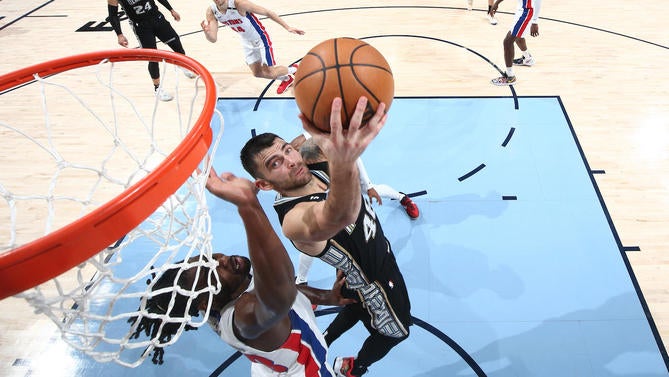
Moschetti and Osborn visited their NBA-player buddy for a week last summer, so they could hang out like they did in college. Both described Konchar as a "normal dude."
"He'll talk to my friends and, without them knowing who he is, he's just another person," Moschetti said.
To answer my call, Moschetti had to end a session of "Rocket League," the vehicular soccer game, with Konchar. During one of their matches in November, Moschetti asked Konchar who he'd be guarding that night. "Brandon Ingram," Konchar replied nonchalantly, because New Orleans Pelicans guard CJ McCollum was out.
Konchar is one of those annoying people who is "naturally good at anything he tries," Moschetti said. "Even something dumb like 'Rocket League.'" He is also "a little video game troll" who loves to taunt opponents by chatting, "What a save!" after scoring against them. In college, when he and Moschetti got sick of getting shots up, they'd play racquetball. Konchar got the knack of it quickly, but was a "pretty reckless" player.
"He'll intentionally try to bean people with the ball and swing as hard as he can," Moschetti said. "Like, he just loves that. He's just such a goober."
Goober.
Troll.
Normal dude.
Jitty.
Definitely not a superhero.
But what is a superhero if not someone with extraordinary abilities who can blend in with the rest of us?
The truth is that no 6-foot-5 wing who rebounds like he's four inches taller is normal. A couple of times before his redshirt season, he played pickup at the outdoor basketball court on campus with "random riff raff," Moschetti said, "and 160-pound John would just be incredible," giving unsuspecting students a new best player they'd ever played against.
"I was the best player at my high school, my area," Moschetti said. "And then you go see John and it's like, 'Oh, there's levels to it.'"
Konchar's career is an underdog story wrapped in layers of irony inside a shell of genuine modesty. He didn't make varsity as a high school freshman, and, as a sophomore his own coach misunderstood him.
"The exact words that were told to me is, 'Your biggest job is going to be to get that guy to work hard,'" Recchia, who took over before Konchar's junior season, said.
Recchia never saw an effort problem, only a player for whom "the game just comes real easy." "I was always working hard," Konchar said. "It just didn't look like I was working hard. Because I don't show emotion, really."
Konchar will never channel Michael Jordan's Hall of Fame speech unless he makes a mockumentary, and he would never have told the Daily Herald how wrong they were to name Sean O'Mara player of the year over him, as Recchia did. This does not, however, mean that he didn't feel disrespected.
"I'd see some other guys around my area get recruited," Konchar said. "It definitely motivated me. But I never really talked about it, I guess. I kind of just went with it and just played harder than everybody else."
"John's simple shrug of the shoulders told me a lot more than just a shrug of the shoulders," Recchia said. "To me, that's like, 'OK, here I go.'"
After describing Konchar as both "carefree" and "careless," Moschetti walked it back, saying that he "definitely portrays" himself to be "more of a carefree [person] than he really is." There was another redshirt on that Fort Wayne team seven years ago, who "didn't care as much, didn't change his body, didn't do anything [extra]." No one on staff was telling Konchar that he had to be in the weight room at 7:45 a.m after getting back from a road trip at 3:30.
Konchar may not have thought he'd make it when he was posting #leaguebound, but he was sure as hell committed to the bit. He put on 40 pounds when he redshirted because he lifted six days a week, got tons of taquitos and dried fruit from Costco, made frequent visits to Qdoba and ate what Osborn described as a "crazy" amount of orange chicken and fried rice from Panda Express. "His lifting, it almost overpowered basketball how much he loved it," Moschetti said. "I think if he wasn't as good at basketball, he would just straight-up become a personal trainer-slash-bodybuilder." Strength and conditioning coach Kevin Rudolphi, who became a close friend, wondered if Konchar might want a job like his.
"He would ask me about maybe a lift or maybe a certain protein brand, just all kinds of stuff," Rudolphi said. "Once he kind of gets his mind into something, he wants to learn a lot about it."
NBA scouts wanted him to raise his usage rate, so Konchar worked with a sports psychologist on being more aggressive and did just that. For his first few months in Memphis, his only minutes came in the G League and garbage time, but "we always stayed in the gym, we were getting shots up or playing some 1s, we were working on our games until like 11 p.m. ,12 a.m.," Yuta Watanabe, then the Grizzlies' other two-way player, said. Year by year, Konchar earned more playing time, more trust and more difficult defensive assignments, with Jenkins continually telling him to "think less, do more," and let it fly from long range when he's open. Now you might even catch him taking a no-dip 3.
Every once in a while, Konchar puts on his own high school highlights and watches a stick-figure version of himself get more air off his left foot than he can now. For all of his goofs, self-deprecation and sarcastic social media posts, he is here because he's just as driven as the next NBA player and just as much of an outlier athletically. He's just low-key about it.
"Everybody says they're working in silence," Osborn said. "But I think John really did."














